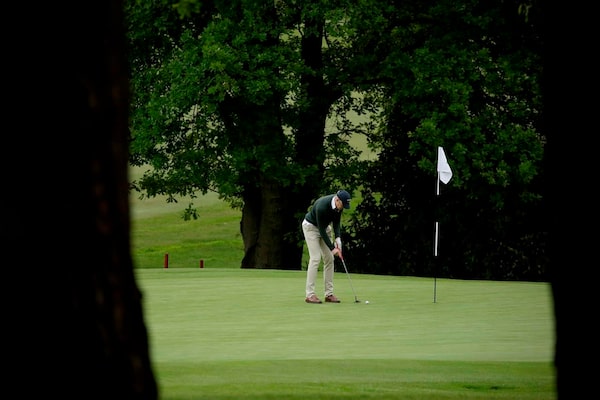
A golfer putts on a green after Sunningdale Golf Club reopened this morning as part of the British government relaxing coronavirus lockdown measures, in Sunningdale, England, on May 13, 2020.The Associated Press
People across Britain packed golf courses, tennis courts and public transit on Wednesday as the country’s near-total lockdown eased for the first time in nearly two months.
The U.K. had been under tight restrictions since March 23 but this week Prime Minister Boris Johnson unveiled a multi-stage plan to lift the lockdown over the next three months. The first step began Wednesday, with people allowed to leave their homes for outdoor activities. Mr. Johnson also encouraged people who can’t work from home to return to their jobs and he said some businesses, such as garden centres, could reopen.
By Wednesday morning, outdoor enthusiasts had headed to golf courses and tennis courts and many tourists flocked to seaside beaches. “It was lovely,” said Ray Holder as he finished 18 holes at the Hunstanton Golf Club in Norfolk. “It’s so good to be back playing. It’s been 50 days.” The club was only open to members and players had to book tee times online. They also couldn’t linger on the course and the clubhouse remained closed along with practice greens.
Real estate agents began showing houses again on Wednesday and Ford Motor Co. announced plans to reopen its two plants in Wales and England next week.
Not everyone welcomed Mr. Johnson’s plan. Several union leaders worried about scenes of overcrowded underground trains and buses in London, and many businesses have yet to outline physical-distancing guidelines. "Maintaining social distancing on trains and the tube is a massive logistical exercise that requires planning,” said Mick Cash, general secretary of the National Union of Rail, Maritime and Transport Workers. “RMT has made it clear that our members have a right to refuse to work in unsafe conditions.”
Mr. Johnson’s decision to stop urging people to stay at home has also caused deep division among regions. Several seaside resorts have balked at reopening beaches and parks, fearing that visitors might spark a resurgence of the virus. The tourism board for Blackpool changed its name on social media this week to “Do Not Visit Blackpool” in a bid to dissuade tourists. “There’s nothing we can do, given the Prime Minister’s advice, to stop people walking on the promenade or the beach, [but] we urge people to not visit Blackpool at the current time,” council leader Simon Blackburn told local reporters this week.
The First Ministers of Scotland, Wales and Northern Ireland have also refused to adopt Mr. Johnson’s plan and kept restrictions largely in place. Most of the powers related to the lockdown have been devolved to the regional governments and they have yet to agree on a U.K.-wide approach to managing the pandemic. Scotland’s First Minister, Nicola Sturgeon, said on Wednesday that her government might remove some restrictions next week but it wasn’t clear if she would go as far as the Prime Minister. “If I get things wrong, I would rather the price of getting things wrong is that people stay in lockdown for a few more days and that the price is not measured in unnecessary deaths,” she told the Scottish Parliament.
Mr. Johnson has dismissed the criticism and insisted the country was working together. “All those who talk about confusion and mixed messages are grossly overstating their position,” he told the House of Commons on Wednesday. “The common sense of the British people is shining through. They can see where we want to go.”
The Prime Minister has been motivated in part by dire warnings about the state of the economy. Figures released Wednesday by the Office for National Statistics (ONS) showed the economy shrank by 2 per cent in the second quarter, which ended on March 31. That included only a few weeks of the pandemic, which took hold in Britain in mid-March. The ONS said the economy contracted by 5.8 per cent in March and most economists have forecast a far steeper decline in the third quarter. The Bank of England has said the country was on track for the worst recession in 300 years in 2020.
“The speed by which this crisis has onset has been alarming,” said a report by James Smith, a developed-markets economist at ING. Mr. Smith also held out little hope the economy would rebound next year. “The prospects of a ‘V-shape’ recovery have long since faded, and we don’t expect the size of the U.K. economy to return to pre-virus levels until at least 2022.”
Sign up for the Coronavirus Update newsletter to read the day’s essential coronavirus news, features and explainers written by Globe reporters and editors.
 Paul Waldie
Paul Waldie